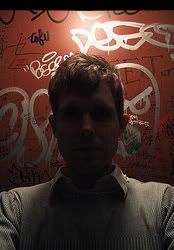A Meaty Interview With Zombie Scholar Helen Matthews
 I've been itching to talk to Helen Matthews ever since Vince told me that she studies zombies for a living; the truth is both more interesting and less sensational than that. Helen listed her top ten horror movies for my AMC article, but her comments on zombies and folklore were too tasty for the cutting-room floor, so here they are in their entirety. (For the record, still looking for people for my weekly "Who Loves Horror?" feature. Give me your friends, I'll be nice.)
I've been itching to talk to Helen Matthews ever since Vince told me that she studies zombies for a living; the truth is both more interesting and less sensational than that. Helen listed her top ten horror movies for my AMC article, but her comments on zombies and folklore were too tasty for the cutting-room floor, so here they are in their entirety. (For the record, still looking for people for my weekly "Who Loves Horror?" feature. Give me your friends, I'll be nice.)
TB: So, tell me as plainly as you can-- what exactly do you do?HM: I’m a graduate student in the process of writing my Master’s Thesis in French Literature at UNC-Chapel Hill, where I also teach French. By day, I answer questions about the subjunctive. By night, I read and about awesome stuff. Not that the subjunctive isn’t awesome.
TB: How did you come into your niche academically-- what inspired you seek it out?HM: I love language and literature. When I realized that I could study them at the same time, it was a pretty natural choice. I started grad school and fell in love with Haitian literature. Then came the zombis...
[Click here for more]
TB: Can you tell me a little about your study of zombies in literature?HM: I’m studying the zombi in the works of two Haitian authors, Dany Laferrière and Émile Ollivier. I’m interested in the ways in which the figure of the zombi can be used to interact with outsiders’ perceptions of Haiti. The zombi activates themes of slavery, American occupation, womanhood, dictatorship, and, most importantly to my research, exploitation. I’m mapping out the texts’ explicit and implicit references to zombification, and placing them in the context of an international dialogue that they reflect, particularly between Haiti and the United States.
TB: Zombie movies have are common as dirt now, though very few of them pay homage to the origins of zombi(e) folklore. Why do you think this is?HM: The early Hollywood flicks, like White Zombie and I Walked with a Zombie, placed the zombie in a Caribbean context. They were interesting films, but they were made during a time in which America was more interested in what was going on “down there” in Haiti. The Serpent and the Rainbow, the Wes Craven film based on Wade Davis’ book, took the zombie phenomenon back to Haiti, but with terribly exploitative results.
At this point, most zombie movies are so far removed from Haitian mythology that they don’t have any right to pay homage. They could pay their etymological dues, I suppose. At this point, the Hollywood zombie films are entrenched in a thematic mythology so complete that they probably don’t have room to bother with Haitian zombis. The proliferation of viral zombie movies speaks for itself: watching contagious zombies eat flesh and run really fast is way more entertaining than pondering the pain of losing your individuality and being forced into labor on a Haitian plantation. What a strange world this is!
TB: Does the proliferation of modern zombie movies make your work easier or harder?HM: Easier. Way easier. The more sensational and further removed from Haiti that zombie films get, the more material I have to prove my point(s).
TB: Has the way you enjoy horror movies changed since you were younger, as a result of your studies?HM: I was never a huge fan of zombie movies, and you’ll notice that none made my top ten, but my Netflix queue is teeming with them. I watch them mainly to stroke my imaginary beard and ponder the many ways in which Haitian mythology is being exploited by American popular culture. I readily admit that I’m usually stretching it.
ME: Which horror movie do you think you've probably seen more times than any other?HM: I pop on Pumpkinhead sometimes while I’m grading my students’ homework. They’d probably be disturbed to hear that.










No comments:
Post a Comment